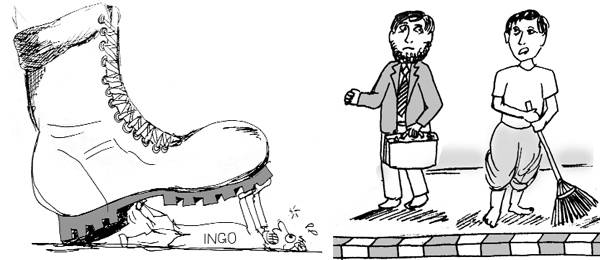
Peaceful nuclear energy
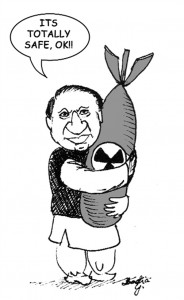
Sir,
The recently concluded seventh round of the US-Pakistan Security, Strategic Stability, and Nonproliferation Working Group in Washington, DC, has yielded promising results in favour of Pakistan. The Pakistani delegation and their US counterparts held productive discussions on a number of issues, including international efforts to enhance nuclear security, peaceful applications of nuclear energy, nonproliferation, export controls, regional stability and security.
The US has welcomed Pakistan’s efforts to harmonize its strategic trade controls with those of the Nuclear Suppliers’ Group and other multilateral export control regimes. It has also endorsed Pakistan’s efforts to strengthen export controls and border security by installing radiation portal monitors at border crossings and hosting IAEA training activities. Both sides have emphasized the desirability of continued outreach to integrate Pakistan into the international nonproliferation regime.
Notwithstanding the scepticism expressed particularly by the Western media regarding Pakistan’s nuclear safety and security, the US official stance itself speaks volumes. There has been too little agreement in the past on crucial matters such as fissile material stocks, nuclear weapons reduction, nuclear safety and security. This round of strategic dialogue was more than just another episode in the saga of continued talks and ineffectual outcomes: effective diplomacy by the Pakistani authorities has disproved the old rhetoric.
Pakistan has made a convincing case for its right to become a member of the Nuclear Suppliers’ Group – which was established to ensure that civilian trade in nuclear materials was not diverted for military purposes. Essentially, Pakistan needs a civilian nuclear deal similar to the Indo-US accord, which allows India access to nuclear technology despite not being a signatory to the Nuclear Nonproliferation Treaty.
For Pakistan, access to civil nuclear technology is a socioeconomic imperative. The country is facing a severe energy crisis: chronic power shortages have restricted its industrial production capacity and constrained economic development. Nuclear energy is a viable option for meeting the country’s growing energy demands, but this will be possible only once Pakistan becomes an accepted part of the global nuclear trade industry.
Yasir Hussain,
Islamabad.
Trials of a jobseeker
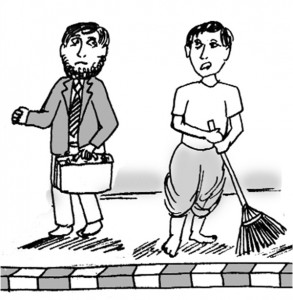
Sir,
It has become increasingly difficult to obtain government or private jobs, whether one is a fresh candidate or has many years of experience. Sadly, the word “merit” in this context is nothing more than a word in the dictionary. Too often, prospective employers will simply favour family members or friends for vacant posts in public sector departments. Moreover, employers seem to forget the expenses that many candidates must bear when searching for jobs: the cost of photocopying, photographs, attested documents, courier charges, travel and accommodation in cases where an out-of-city test or interview is required. Ironically, when fresh candidates apply for a suitable post, they may not be shortlisted on the grounds that they lack experience. But unless they are given the chance to prove their worth, how can they gain the experience they need?
I would like to raise another point in this context. Candidates applying to the Sindh Public Services Commission (SPSC) are required to submit a fee against the relevant post using a standard challan form available from the National Bank of Pakistan. On occasion, the bank gives the incorrect receipt number, which prevents candidates from applying for the post online.
Government departments must select candidates on the basis of merit, not nepotism. The SPSC needs to ensure that bankers are better trained in handling receipts so that such mistakes are not repeated and candidates are saved the trouble.
Shahid Ahmed Qureshi,
Badin.
Property tax
Sir,
The provision for property tax in Islamabad reads: “5% rebate [is] allowed on payment of current tax up to 30 September. Surcharge @1.5% per month shall be payable on the outstanding tax after expiry of financial year.” I suggest this rebate be withdrawn and the surcharge be made payable post-September till the end of the financial year. There should be tough measures in place to recover any arrears. It is in the national interest to adopt a hard line with respect to tax matters.
Kh. Taraq,
Islamabad.
Rohingya woes

Sir,
The world’s conscience seems to be in deep slumber while Pakistan speaks up against the bitter plight of thousands of oppressed Rohingya (Myanmar) Muslims. I cannot comprehend how the world’s civilized societies and the UN can remain indifferent to the grave predicament of the Rohingya Muslims. A brief history is perhaps required to put this in context.
Myanmar, formerly Burma, has a Buddhist majority. The Muslim minority consists mainly of Rohingya people and the descendants of Muslim immigrants from India (including what is now Bangladesh), China (the ancestors of Chinese Muslims in Myanmar came from the Yunnan province), and early Arab settlers. Indian Muslims migrated to Burma during British rule, attracted by the expanding economy, especially in clerical work and business. Many Muslims retained their positions and achieved prominence in business and politics after independence. According to Human Rights Watch, the Burmese government has denied citizenship to any Rohingya persons who cannot prove that their ancestors settled in the country before 1823 – the beginning of the British occupation of what is now the Arakan state.
This illustrates why the poor Rohingya Muslims have borne and continue to bear inhuman treatment from those at the helm in Myanmar. The Muslims of Rohingya are deprived of their fundamental rights and forced to live a miserable life in a world that preaches human rights, but turns a blind eye to their plight.
The Government of Pakistan has come down heavily on the silence of human rights organizations and the global community concerning the massacre of the Rohingya Muslims. It has expressed its shock and indignation over the lukewarm response of the international community and the shameful silence of human rights advocates, categorically condemning this persecution and genocide. It has also boldly stated that the Rohingya situation raises serious questions about the efficacy of international forums that claim to uphold, defend, and promote human rights.
Geared up to provide all possible assistance to the Rohingya Muslims, Pakistan has made an ardent appeal to the UN, OIC and regional powers to take immediate notice of the genocide. Like Pakistan, the world in general – and the Muslim world in particular – must wake up and take cognizance of the matter, and do whatever is required to provide them the aid they so badly need.
M. Fazal Elahi,
Islamabad.
“Pot, meet kettle”

Sir,
Whenever the flames heat up the pot, the kettle and skillet accuse it hysterically of being “blacker” – each claiming they are whiter than white. Ours is a nation of sacred cows herding together, determined to protect their interests and turf rights, be it through appropriately designed constitutional firewalls, the power of bigoted divinity, the crushing force of coercion or just the finality of the business end of a bullet. Each is also ready to cast the first stone that exposes the misdeeds of others – as long as this does not boomerang back and expose their own skeletons.
Hardly any state institution exists that is not deeply tainted by incompetence, nepotism and the stench of corruption. It does not require much intelligence to recognize the incongruity between the sumptuous lifestyles of our leaders, politicians and the feudal classes with their declarations of piety in near poverty. They and their lineage have thrived and the country is testament to the destructive effects of their rapacious appetites.
Much of Pakistan’s existence has been spent with our military ruling the roost. Always, it has been the mantra of corruption and failure of civilian governance that has eased them in and people have applauded them for doing so. A decade or so of development later, the ground reality has not altered. People will still frenetically applaud yet another civilian ‘ism’ of misrule. All that changes in dynastic business – as usual – is fresh sartorial splendour with attempts to make up for lost time and income.
The pie is redistributed to reasonable mutual satisfaction until it is depleted. People then applaud the next anticipated change, which they hope will fall from heaven. The more things change, the more they stay the same. Some patsies take the fall; a few lowly lambs are sacrificed. No sacred cow will hang: they will be rehabilitated, forgiven, even blessed for better luck the next time around. Can anyone count the number of times the real perpetrators have been indicted and punished to the benefit of the nation?
Again the sound of jackboots is heard, reinforcing the reality that politics really makes strange bedfellows. Another round of recriminations almost drowned by the howls of righteous indignation by those most affected. Minions are being caught and the people applaud as they hear the “breaking” revelations they already knew but are desperate to hear reiterated. Again, rats jump ship, allegiances and alliances evaporate and re-apparate with lines redrawn for business as usual without being exposed or caught in the temporary turbulence. Musical chairs: Round N?
We have seen this before. We have hoped that there will be an “Atta-pak” true to his conscience to rid us of our sacred cows. Not selectively, but across the board. And then, help us get back to the original purpose of our existence. So far, the winning beneficiary of Pakistan’s sacred cow status seems to be the highly advertised product, Fair and Lovely (™), which claims to be able to “whiten the blackest of faces.”
Dr Mervyn Hosein,
Karachi.
INGOs get the boot
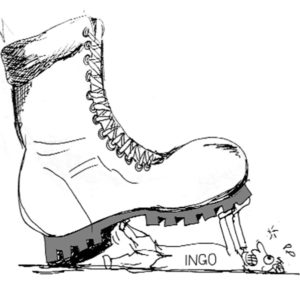
Sir,
A wave of international nongovernment organizations (INGOs) entered Pakistan during the Musharraf regime – but without verifying their eligibility or complying with registration requirements – all in the name of “social development”. They may have claimed to be working with local vulnerable communities, but many were simply operating in their own interests.
Thank goodness the Nawaz government has realised this and taken prompt action. Why are such INGOs working directly with communities rather than outsourcing their activities to local NGOs and community-based organisations? Although international pressure has kept the government from expelling all unregistered INGOs, it needs to set fresh regulations in this respect.
I suggest that the government not rely on the Interior Ministry or EAD to frame such regulations, but ask Pakistani NGOS, rural support programs and national donors to do so instead. INGOs should be required to outsource at least 90 percent of their activities to local NGOs and focus on local recruitment as per the needs of the project and community. The government should also suggest which priority areas INGOs are to focus on and monitor their activities carefully.
Aijaz Ali Khuwaja,
Karachi.
Zardari runs out of patience
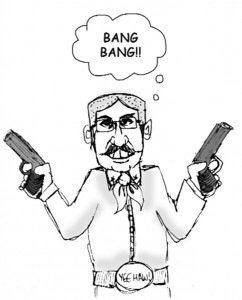
Sir,
Asif Ali Zardari, who usually avoids confrontation, did not mince his words when levelling charges against the military leadership, apparently for tightening the noose against the top PPP leadership – including Zardari himself – on account of corruption. He warned General Raheel Sharif to stop presenting “lists” to the media or else he would disclose a list of corrupt generals going back to 1947 and compel the entire country – from Karachi to Khyber – to come to a standstill. Reminding the COAS of his limited tenure of three years vis-à-vis the permanence of the political leadership at the helm of affairs, he also mentioned the Charter of Democracy and the support extended to Prime Minister Nawaz Sharif during the dharna crisis last year.
During the PPP government, Zardari maintained a cordial relationship with the military establishment and even took credit for the Swat operation. The army provided support to his political government during the floods and helped ensure the continuity of democracy despite charges of corruption levelled against the top leadership of the PPP.
After the raid on Nine Zero by the Rangers in Karachi and the subsequent arrest of alleged killers and members of militant groups, there is growing pressure on the political and military hierarchy to deal with militant groups associated with all political parties. These groups are known to be involved in extortion, land grabbing and other mafias and must be dealt with across the board. The press conference held by the DG Rangers, highlighting the volume of illegal money gathered through corruption and the list of alleged perpetrators given to the Apex Committee for legal action, has sent a shockwave among the supporters and patrons of these culprits.
But Zardari’s unexpected outburst has surprised both political analysts and politicians. His confrontation with the army is likely to dilute support to the PPP and alienate them from their political allies.
To ensure justice without discrimination, the onus of accountability should be on the political government, duly assisted by the institutions concerned. Over time, both the political elite and bureaucracy have begun to think they are above the law. Corruption is so deep-rooted and pervasive in our society that it has become an accepted norm. Unless we get rid of the corrupt leadership, the country cannot achieve any rightful sovereignty.
It seems appropriate for the central government and the army to take the lead role in the war on terror and the National Action Plan. Other law enforcement agencies should be involved only in executing plans to help eliminate terrorists, target killers, money launderers, the land mafia, abductors, and smugglers – and otherwise remain behind the scenes. The interior and information ministers should apprise both the media and the public of the progress of the National Action Plan. Similarly, instead of press conferences organized by the DG Rangers and other on-ground commanders, central press briefings by the ISPR should be held. As a nation, we need to maintain and uphold the sanctity of the armed forces without compromising on internal and external security.
Muhammad Latif,
Islamabad.

